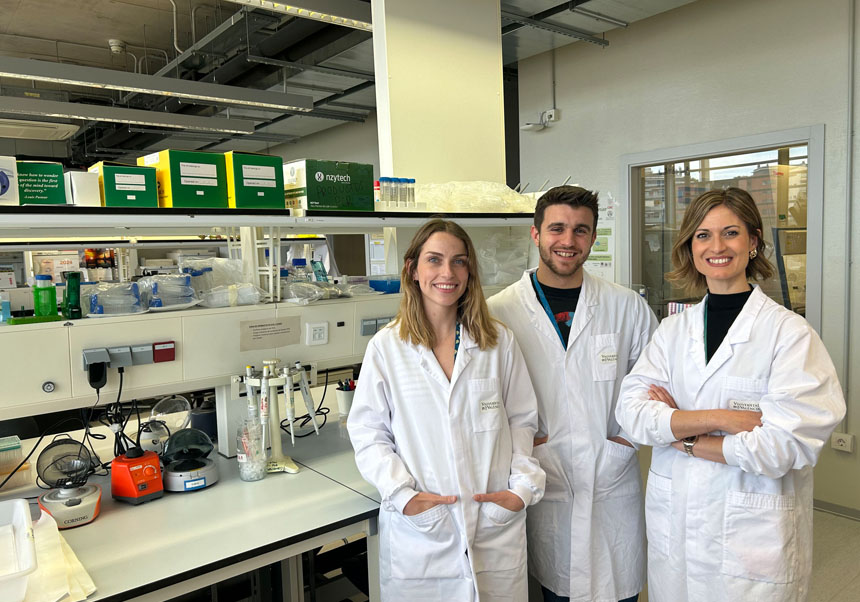Users
Social media
- More details here...
- Address
Parc Científic de la Universitat de València C/
Catedrático Agustín Escardino, 9
46980 Paterna (Valencia) Spain - Email:
iu.i2sysbio@uv.es - Phone:
(+34) 963544810
- Address
Links
The University and the CSIC obtain the first clinical results of viruses that destroy multi-resistant bacteria

Investigation
The University and the CSIC obtain the first clinical results of viruses that destroy multi-resistant bacteria

Research staff from the Institute of Integrative Systems Biology (I2SysBio), a joint center of the University of Valencia and the Higher Council for Scientific Research, together with the Yale Phage Therapy Center (USA), the La Fe University Hospital in València and the Virgen del Hospital. Rocío de Sevilla, have published an evaluation of the therapeutic use of viruses that infect bacteria, known as phages, used to treat respiratory infections. The work, published in the prestigious journal “Med” (Cell Press), provides promising results and represents an advance in phage therapy.
Among all the infections that worry the healthcare sector, pathogenic bacteria resistant to antibiotics continue to be a challenge to be solved. The emergence of multidrug-resistant bacteria especially affects patients with cystic fibrosis who suffer from recurrent bacterial infections in the lungs. Using a protocol developed by the Virology Group Environmental and Biomedical of I2Sysbio, led by Pilar Domingo-Calap, the first phage preparations have been produced in Spain, which have been approved by the Spanish Agency for Medicines and Health Products (AEMPS) for compassionate use.
carried out in collaboration with Spanish hospitals and the Yale Phage Therapy Center a dozen treatments, with successful results in the majority of patients. Among them, those published in the magazine Med, carried out at the La Fe University and Polytechnic Hospital in Valencia and the Virgen del Rocío Hospital in Seville, stand out. These are two patients with cystic fibrosis who presented respiratory infections caused by Staphylococcus aureus and/or Pseudomonas aeruginosa. “The treatments were tolerated without generating any side effects, but in all cases neutralizing antibodies against the therapeutic phages were detected,” explains Pilar Domingo. Despite this, a reduction in infection and clinical improvement was observed in one of the patients. text-indent:0cm">In this work, researchers have reported for the first time the appearance of antibodies directed at phages after nebulized therapies (therapies that administer the drug through a nebulizer or inhaler), which demonstrates their ability to induce an immune response even in short and minimally invasive therapies. These findings underscore the need for long-term follow-up of patients to evaluate the immune system response.
Standardized monitoring procedures have made it difficult to implement phage therapy in hospitals. The approval of these treatments by the AEMPS is complex, and their use is restricted only to patients in critical condition. Future clinical trials will allow us to evaluate its effectiveness and validate its use in patients. text-indent:0cm">With these results, the group led by Pilar Domingo defends the use of personalized therapies to avoid the generation of undesirable antibodies against possible therapeutic phages. “This research represents a significant advance in the understanding of phage therapy, laying the foundations for future clinical trials,” highlights the I2SysBio researcher.
crowdfunding @AdoptaUnFago promoted by the Spanish Cystic Fibrosis Foundation and the projects SEJIGENT/2021/014, PID2020-112835RA-I00 and the Ramón y Cajal contract RYC2019-028015-I.
Article reference: Mireia Bernabéu-Gimeno, Marco Pardo-Freire, Benjamin K. Chan, Paul E. Turner, Ana Gil-Brusola, Santiago Pérez-Tarazona, Laura Carrasco-Hernández, Esther Quintana-Gallego, Pilar Domingo-Calap. 2024. «Neutralizing antibodies after nebulized phage therapy in cystic fibrosis patients». Med (Cell Press). 5:1-16. DOI: https://doi.org/10.1016/j.medj.2024.05.017


